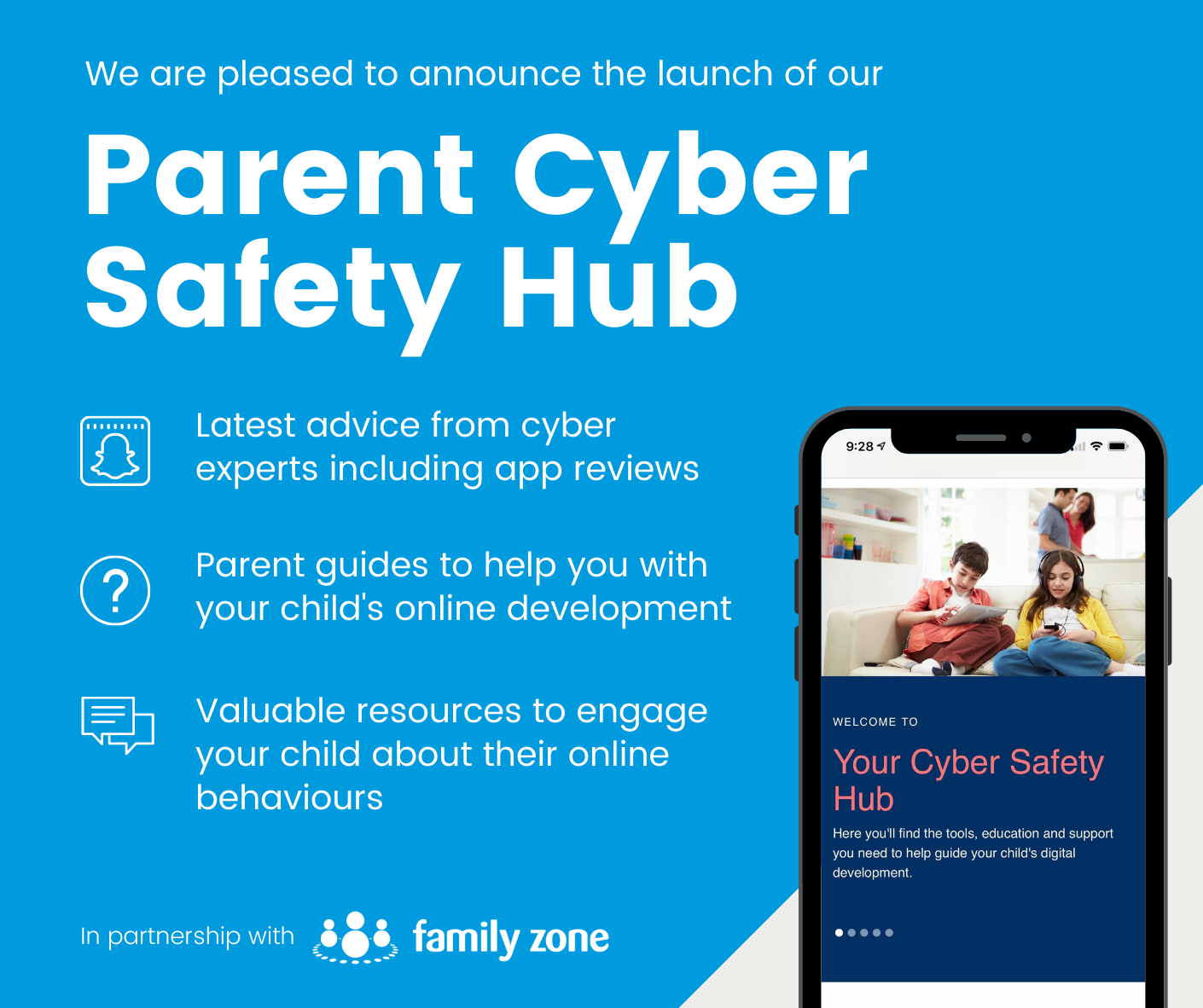Cyber Safety

Check out our Cyber Safety Hub
We are delighted to introduce you to a new resource made available to you through our partnership with Family Zone - our new school Cyber Safety Hub.
As you may already be aware, our partnership provides your family with access to the Family Zone tools to use at home with your children if you wish. The purpose of the Cyber Safety Hub is to complement those tools with practical guidance and information to further support you in engaging with your children in their digital development. These tools and resources also allow the school and parent body to work together on creating a holistic approach to guiding each student's online journey.
You can access the Cyber Safety Hub using the link below:
https://johnxxiii.cybersafetyhub.com.au/
About the Parent Cyber Safety Hub
The Cyber Safety Hub includes resources to help your family better understand the different Family Zone tools available to you and how to use them, plus access to regular cyber safety events to help you stay informed about the latest digital trends.
Also, the Cyber Safety Hub provides expert advice from leading cyber experts, ySafe, on the most pertinent issues and frequently asked questions around platforms like TikTok, Fortnite, Instagram, and more. There are app reviews with age and safety recommendations, along with a range of guides to help ensure healthy boundaries around screen-time & gaming, plus step-by-step instructions for using parental controls and filtering out inappropriate content.
We are very excited to be able to offer you this level of expertise and support. We look forward to working closely with you as we develop the cyber safety conversation within our school community.
Have our kids lost the 'right to make mistakes'?
What our kids post on social media is forever. Calls for 'digital erasure' could change all that.
Dumb, drunken photos. Racist slurs. Homophobic tirades. Religious extremism. Soul-baring confessions of mental illness, addiction and self-harm.
Social media is literally driven by drama. It’s built right into its algorithms.
Dropping young people into that environment - when their brains are not yet fully mature, and the need to experiment with ideas and identity is developmentally driven - is a recipe for regret. If not immediately, then eventually.
The problem? "A whole lot of content, whether it’s accurate or not, is there with you when you become an adult," says digital literacy specialist Joanne Orlando.
And the impact of that content, particularly what kids post on social media, can be devastating.
The digital erasure option
A recent US study found 36% of college admissions officers access applicants’ social profiles. Fifty-eight percent said the result had a negative impact on their decision-making.
Calls for a “digital erasure option” are increasing, but the issue is controversial, pitting the right to free speech against the right to privacy - sometimes called “the right to be forgotten.”
Experts raise a host of thorny questions - At what point should kids know better? When, if ever, should a person’s permanent digital record begin? Can social media be reserved somehow as a space for experimentation around identity and social behaviour for young people?
“These are fantastically difficult moral dilemmas for teenagers who act impulsively, using tools that are not fully under their control, leading to consequences that perhaps none of us can anticipate,” Sonia Livingstone, professor of social psychology at the London School of Economics and Political Science, told The Washington Post.
“This is the first time we’ve had a society in which almost by default, everything is recorded and shared and aggregated in ways that create a lifelong profile. Children should have the right to make mistakes.”
27-year-old Alexi McCammond was denied that right recently, when objectionable tweets she’d posted a decade previously came to light - costing her a top job as editor-in-chief of Teen Vogue.
Teens’ underdeveloped brains do lead them to impulsive behaviour, both online and off. As Orlando notes, “adolescence is a time when we are highly influenced by others. What we do and say is not necessarily genuine to who we are.”
But in the online world, even a single ill-considered comment can shadow a young person well into adulthood. Spoken words dissolve and are forgotten. Words and images posted online are forever.
What's the solution?
But what to do to prevent our children’s social posts from casting a shadow over their later academic and career prospects?
Legal skills professor Stacey Steinberg advocates teaching kids a new set of skills for engagement online while establishing “public policy and perhaps law” to protect them.
Former Google CEO Eric Schmidt has gone even further - suggesting that, in order to distance themselves from their youthful online identities, young people be granted the right to change their names.
In Europe, regulations allow individuals to petition for digital erasure of content that “no longer reflects who they are” and “no longer serves a legitimate purpose.”
Once granted, digital erasure does not actually “erase” problematic posts. It simply prevents them from being linked to that person via search engines.
Reference: https://www.familyzone.com/anz/families/blog/have-our-kids-lost-the-right-to-make-mistakes


